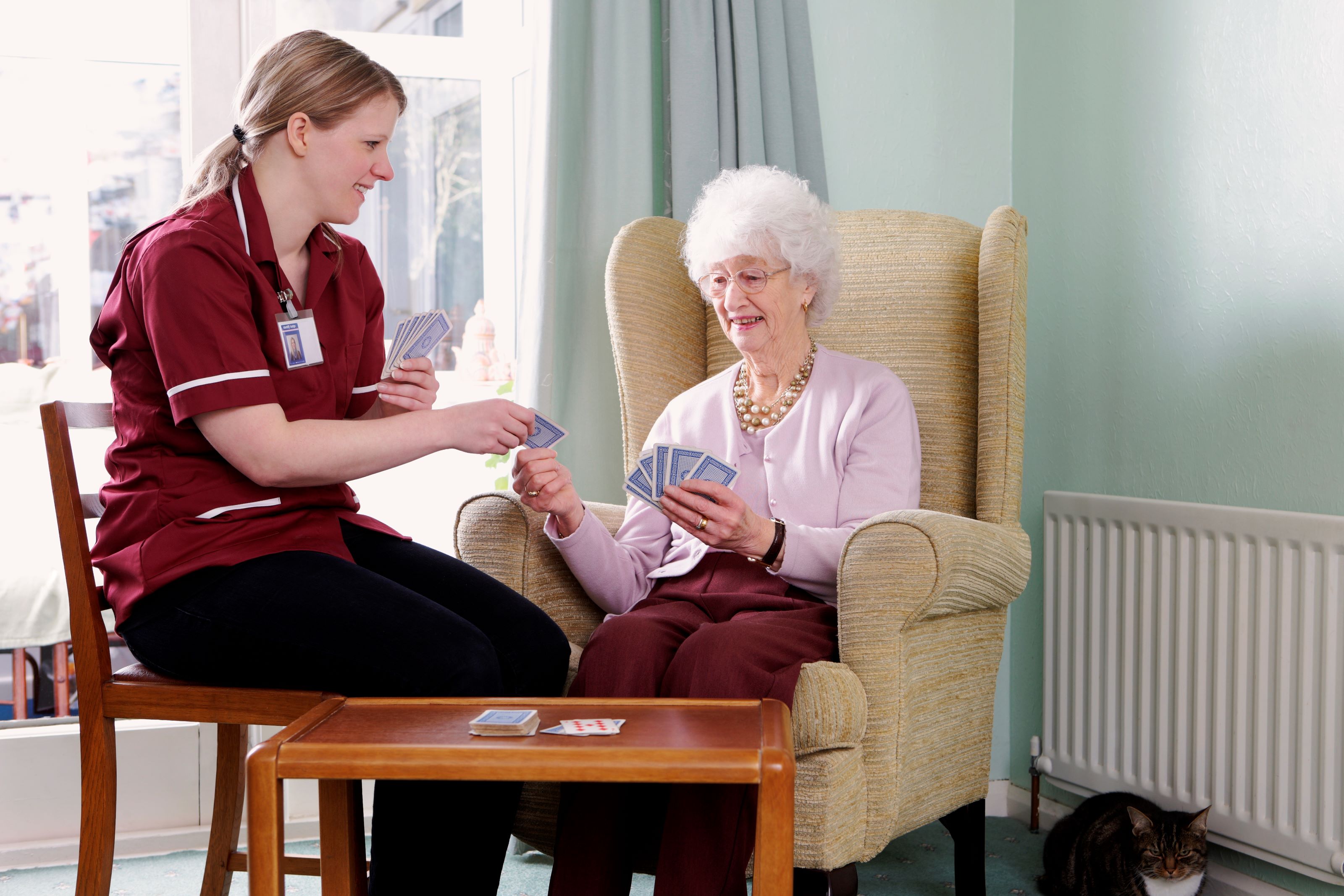5 Steps to Getting Help From a Home Care Agency
A home health aide who helps provide nonmedical care to a loved one can be a great way to provide some relief to a caregiver.

Profit and prosper with the best of Kiplinger's advice on investing, taxes, retirement, personal finance and much more. Delivered daily. Enter your email in the box and click Sign Me Up.
You are now subscribed
Your newsletter sign-up was successful
Want to add more newsletters?

Delivered daily
Kiplinger Today
Profit and prosper with the best of Kiplinger's advice on investing, taxes, retirement, personal finance and much more delivered daily. Smart money moves start here.

Sent five days a week
Kiplinger A Step Ahead
Get practical help to make better financial decisions in your everyday life, from spending to savings on top deals.

Delivered daily
Kiplinger Closing Bell
Get today's biggest financial and investing headlines delivered to your inbox every day the U.S. stock market is open.

Sent twice a week
Kiplinger Adviser Intel
Financial pros across the country share best practices and fresh tactics to preserve and grow your wealth.

Delivered weekly
Kiplinger Tax Tips
Trim your federal and state tax bills with practical tax-planning and tax-cutting strategies.

Sent twice a week
Kiplinger Retirement Tips
Your twice-a-week guide to planning and enjoying a financially secure and richly rewarding retirement

Sent bimonthly.
Kiplinger Adviser Angle
Insights for advisers, wealth managers and other financial professionals.

Sent twice a week
Kiplinger Investing Weekly
Your twice-a-week roundup of promising stocks, funds, companies and industries you should consider, ones you should avoid, and why.

Sent weekly for six weeks
Kiplinger Invest for Retirement
Your step-by-step six-part series on how to invest for retirement, from devising a successful strategy to exactly which investments to choose.
Being a caregiver is a stressful, nonstop job so finding a nonmedical home care service to help out can be a blessing. But you also need to find the right person to care for your loved one.
Here are five steps to take to help you find a home care aide who can provide some much needed and well-deserved relief.

Start Early
The pandemic and a shifting job market have made it harder to find home health aides. Plus, "the first person you hire may not be the best fit, and the first schedule you create may not be what you need long term," says Christina Irving, client services director at the Family Caregiver Alliance.

Ask Questions
The agency is responsible for conducting background checks on the aides. Ask what it checks. You need to be able to trust this person around your home. Because caregiving is physically demanding work that can sometimes injure the caregiver, make sure the agency is licensed, bonded and insured. You should also check with your own insurer if you need to make changes to your home or auto coverage. For example, most aides have their own cars to drive your loved one around, but if an aide will be using your vehicle, you will need to add them to your policy.

Sell the Idea
The person needing the care may claim they don't need an aide. Tell them it's to help the caregiver or have a doctor, care manager or some other authoritative figure say that an aide is necessary, suggests Connie McKenzie, president of the Aging Life Care Association. Emphasize that the help doesn't have to be permanent, or call the aide a housekeeper, adds Irving. That way, "it's not about the individual not being independent but to help the household."

Find the Right Person
Consider aide characteristics, like gender, that might make an outsider more acceptable to the person needing care. Look for someone who shares some of the same hobbies. Irving had a client whose mom liked playing a particular card game, so they found an aide who knew the game and could play it with the mother.

Be on Hand the First Few Sessions
"You want to observe them and make sure they are taught any specific care needs that are unique to the individual being cared for," Irving says. After that initial training, the family member can come in and out. Don't be present for an entire shift, she says, because "the person needing care may continue to rely on the caregiver and not turn to the home provider for help."
Profit and prosper with the best of Kiplinger's advice on investing, taxes, retirement, personal finance and much more. Delivered daily. Enter your email in the box and click Sign Me Up.
Siskos is an old hat with the Kiplinger brand. More than a decade ago, she spent eight years writing about personal finance for Kiplinger's Personal Finance magazine, including a monthly column—Starting Out—that served young adults. That was in her salad days. Now she's turned her attention to an audience she hopes to join in a decade or so: retirees. Siskos is the managing editor for Kiplinger's Retirement Report. In between, she broadened her personal-finance repertoire with real estate and investing stories at Old-House Journal, Investing Daily and U.S. News. She comes to Kiplinger by way of the Newseum, where she worked as an exhibit editor.
-
 Quiz: Do You Know How to Avoid the "Medigap Trap?"
Quiz: Do You Know How to Avoid the "Medigap Trap?"Quiz Test your basic knowledge of the "Medigap Trap" in our quick quiz.
-
 5 Top Tax-Efficient Mutual Funds for Smarter Investing
5 Top Tax-Efficient Mutual Funds for Smarter InvestingMutual funds are many things, but "tax-friendly" usually isn't one of them. These are the exceptions.
-
 AI Sparks Existential Crisis for Software Stocks
AI Sparks Existential Crisis for Software StocksThe Kiplinger Letter Fears that SaaS subscription software could be rendered obsolete by artificial intelligence make investors jittery.
-
 457 Plan Contribution Limits for 2026
457 Plan Contribution Limits for 2026Retirement plans There are higher 457 plan contribution limits in 2026. That's good news for state and local government employees.
-
 Medicare Basics: 12 Things You Need to Know
Medicare Basics: 12 Things You Need to KnowMedicare There's Medicare Part A, Part B, Part D, Medigap plans, Medicare Advantage plans and so on. We sort out the confusion about signing up for Medicare — and much more.
-
 The Seven Worst Assets to Leave Your Kids or Grandkids
The Seven Worst Assets to Leave Your Kids or Grandkidsinheritance Leaving these assets to your loved ones may be more trouble than it’s worth. Here's how to avoid adding to their grief after you're gone.
-
 SEP IRA Contribution Limits for 2026
SEP IRA Contribution Limits for 2026SEP IRA A good option for small business owners, SEP IRAs allow individual annual contributions of as much as $70,000 in 2025, and up to $72,000 in 2026.
-
 Roth IRA Contribution Limits for 2026
Roth IRA Contribution Limits for 2026Roth IRAs Roth IRAs allow you to save for retirement with after-tax dollars while you're working, and then withdraw those contributions and earnings tax-free when you retire. Here's a look at 2026 limits and income-based phaseouts.
-
 SIMPLE IRA Contribution Limits for 2026
SIMPLE IRA Contribution Limits for 2026simple IRA For 2026, the SIMPLE IRA contribution limit rises to $17,000, with a $4,000 catch-up for those 50 and over, totaling $21,000.
-
 457 Contribution Limits for 2024
457 Contribution Limits for 2024retirement plans State and local government workers can contribute more to their 457 plans in 2024 than in 2023.
-
 Roth 401(k) Contribution Limits for 2026
Roth 401(k) Contribution Limits for 2026retirement plans The Roth 401(k) contribution limit for 2026 has increased, and workers who are 50 and older can save even more.
